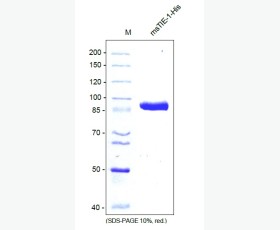Recombinant Mouse 4-1BB/TNFRSF9/CD137
| Product name: | Recombinant Mouse 4-1BB/TNFRSF9/CD137 |
| Source: | Human Cells |
| Purity: | Greater than 95% as determined by reducing SDS-PAGE. |
| Buffer Formulation: | Supplied as a 0.2 μm filtered solution of 20mM PB,150mM NaCl,pH7.4. |
| Applications: | Applications:SDS-PAGE; WB; ELISA; IP. |
| Storage: | Avoid repeated freeze/thaw cycles. Store at 2-8 oC for one month. Aliquot and store at -80 oC for 12 months. |
| UOM: | 100ug/50ug/200ug/1mg/1g |
| Source | Human Cells |
| Description | Recombinant Mouse 4-1BB ligand receptor is produced by our Mammalian expression system and the target gene encoding Val24-Leu187 is expressed with a Fc tag at the C-terminus. |
| Names | Secreted CD137 antigen ,Tumor necrosis factor receptor superfamily member 9 ,Tnfrsf9 |
| Accession # | P20334 |
| Formulation | Supplied as a 0.2 μm filtered solution of 20mM PB,150mM NaCl,pH7.4. |
| Shipping |
The product is shipped on dry ice/ice packs. |
| Storage |
Store at < -20°C, stable for 6 months after receipt. Please minimize freeze-thaw cycles. |
| Purity |
Greater than 95% as determined by reducing SDS-PAGE. |
| Endotoxin | Less than 0.1 ng/µg (1 IEU/µg) as determined by LAL test. |
| Amino Acid Sequence |
VQNSCDNCQPGTFCRKYNPVCKSCPPSTFSSIGGQPNCNICRVCAGYFRFKKFCSSTHNAECECI EGFHCLGPQCTRCEKDCRPGQELTKQGCKTCSLGTFNDQNGTGVCRPWTNCSLDGRSVLKTGTTE KDVVCGPPVVSFSPSTTISVTPEGGPGGHSLQVLVDDIEGRMDEPKSCDKTHTCPPCPAPELLGG PSVFLFPPKPKDTLMISRTPEVTCVVVDVSHEDPEVKFNWYVDGVEVHNAKTKPREEQYNSTYRV VSVLTVLHQDWLNGKEYKCKVSNKALPAPIEKTISKAKGQPREPQVYTLPPSREEMTKNQVSLTC LVKGFYPSDIAVEWESNGQPENNYKTTPPVLDSDGSFFLYSKLTVDKSRWQQGNVFSCSVMHEAL HNHYTQKSLSLSPGK
|
| Background | Tumor necrosis factor receptor superfamily member 9(TNFRSF9) is a member of the tumor necrosis factor (TNF) receptor family. It can be induced by lymphocyte activation (ILA) and is expressed by activated T cells, but to a larger extent on CD8 than on CD4 T cells. In addition, TNFRSF9 expression is found on dendritic cells, follicular dendritic cells, natural killer cells, granulocytes and cells of blood vessel walls at sites of inflammation. As receptor for TNFSF9/4-1BBL, it can activate T cells and the cross-linking of this protein can enhance T cell proliferation, IL-2 secretion survival and cytolytic activity. Further, it can enhance immune activity to eliminate tumors in mice. |














